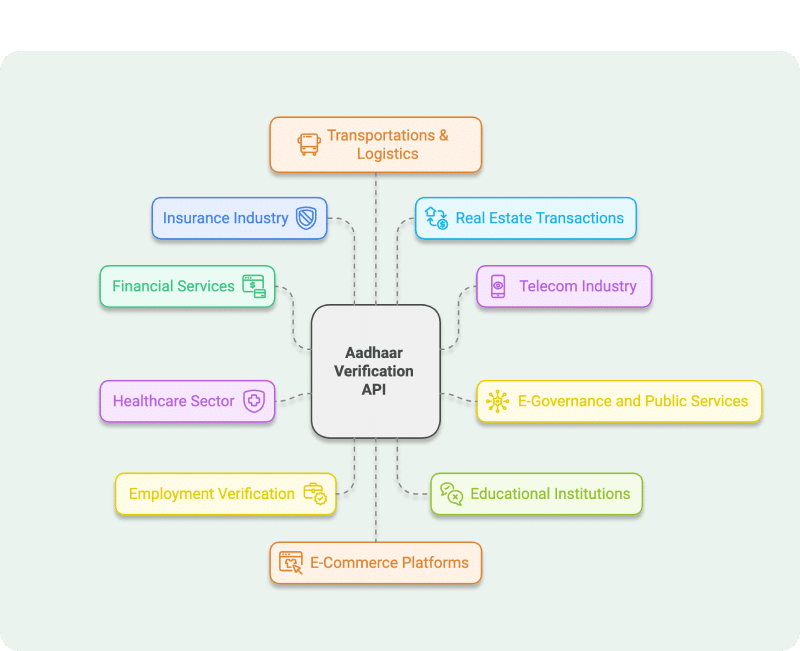As businesses scale and consumer expectations rise, the need for seamless and secure identity verification is more crucial than ever. Enter the Aadhaar Verification API—a powerful tool designed to authenticate identities in real-time, backed by the world’s largest biometric identification system.
With over 1.3 billion Aadhaar holders in India, leveraging Aadhaar Verification APIs can significantly streamline operations across industries. Whether you’re onboarding new customers in financial services, issuing SIM cards in telecom, or verifying policyholders in insurance, Aadhaar-based verification ensures speed, security, and compliance.
But how exactly can this technology be applied to your business? In this blog, we’ll explore the top 10 use cases of Aadhaar Verification API, showcasing its versatility and potential to transform your workflows. From enhancing fraud prevention to simplifying KYC processes, these use cases highlight why adopting Aadhaar APIs is more than just a compliance measure—it’s a pathway to efficiency and trust.
Let’s dive in!

Use Case 1: Financial Services
Aadhaar Verification API plays a crucial role in transforming how banks, lending platforms, and financial institutions handle Know Your Customer (KYC) processes. By integrating Aadhaar verification, financial services can achieve quicker customer onboarding, mitigate fraud, and remain compliant with Reserve Bank of India (RBI) regulations.
The number of bank accounts opened under the Pradhan Mantri Jan Dhan Yojana (PMJDY) surpassed 490 million by 2023. A significant portion of these accounts leveraged Aadhaar-based e-KYC to simplify and accelerate the verification process. Aadhaar Verification API allows financial institutions to validate key customer details like name, date of birth, and address in real-time, eliminating the need for cumbersome paperwork and manual checks.
Benefits of Aadhaar Verification API in financial services include:
- Faster Onboarding
- Fraud Prevention
- Cost Efficiency
- Regulatory Compliance
Use Case 2: Telecom Industry
In the telecom industry, customer identity verification is a regulatory requirement and a critical step in reducing fraud. Aadhaar Verification API has revolutionized the way telecom companies verify subscribers during SIM card issuance and service activation. By integrating Aadhaar-based e-KYC, telecom operators can ensure that only genuine users are onboarded, enhancing security and streamlining the verification process.
The Department of Telecommunications (DoT) mandates strict KYC verification for all new mobile connections to curb identity fraud and misuse. India had over 1.14 billion active mobile subscribers as of 2023. To manage such vast numbers, telecom providers like Jio, Airtel, and Vodafone-Idea have adopted Aadhaar-based e-KYC for faster and more secure onboarding.
Benefits of Aadhaar Verification API in Telecom:
- Instant SIM Activation
- Fraud Mitigation
- Compliance Assurance
- Operational Efficiency
Use Case 3: E-Governance and Public Services
In a country as vast and diverse as India, delivering government services efficiently requires innovative solutions. Aadhaar Verification API has become a cornerstone for e-Governance by enabling quick, secure, and transparent verification of citizens across a range of public services. From welfare distribution to digital certificates, Aadhaar authentication ensures that benefits and services reach the right individuals without delays or leakages.
As of 2023, more than 1.3 billion Aadhaar numbers have been issued, covering 99% of the adult population in India, according to UIDAI. Various government initiatives leverage Aadhaar Verification API to authenticate beneficiaries in real-time. For example, the Public Distribution System (PDS) uses Aadhaar-based biometric authentication to ensure that food subsidies are delivered to genuine recipients, reducing leakage by up to 15%.
Key Applications of Aadhaar Verification API in E-Governance:
- Welfare Schemes
- Digital Certificates
- Pension Disbursement
Use Case 4: Healthcare Sector
In the healthcare sector, accurate patient identification is critical to delivering timely and effective medical services. Aadhaar Verification API offers a streamlined solution to authenticate patients, ensuring that medical records, health benefits, and insurance claims are accurately matched to the right individuals. This not only reduces errors but also enhances the efficiency of healthcare delivery and insurance processes.
With initiatives like the Ayushman Bharat Digital Mission (ABDM), which aims to create a digital health ecosystem, Aadhaar verification has become essential. As of 2023, over 450 million health IDs (ABHA IDs) have been generated, allowing seamless identification of patients and access to their medical records. Hospitals and clinics can verify patient identities using Aadhaar APIs, ensuring that medical histories, prescriptions, and treatment plans are securely linked to the correct person.
Key Applications of Aadhaar Verification API in Healthcare:
- Patient Registration
- Health Insurance Claims
- Telemedicine Services
- Government Health Schemes
Use Case 5: Employment Verification
In today’s competitive job market, verifying a candidate’s identity and background is crucial to maintaining workplace integrity and security. Aadhaar Verification API simplifies and accelerates the employment verification process by offering real-time identity validation. Whether during onboarding, background checks, or contract employment, Aadhaar-based verification helps employers ensure that they are hiring genuine candidates, reducing the risk of identity fraud and misrepresentation.
Around 22% of discrepancies in background checks in India are related to identity verification. This makes it essential for organizations to adopt robust and reliable methods like Aadhaar-based verification to mitigate such risks.
Key Applications of Aadhaar Verification API in Employment:
- Employee Onboarding
- Background Checks
- Temporary or Contract Workforce
- Preventing Ghost Employees
Use Case 6: Educational Institutions
Educational institutions, ranging from schools to universities, are increasingly leveraging Aadhaar Verification APIs to streamline student identification, enrollment, and administration processes. By verifying identities through Aadhaar, institutions can ensure that student records are accurate, benefits reach the intended recipients, and fraudulent admissions are minimized.
Over 340 million students have been enrolled using Aadhaar-based verification across various educational schemes. The Indian government’s initiatives, like the Mid-Day Meal Scheme and scholarship programs, rely on Aadhaar verification to ensure transparency and prevent misuse.
Key Applications of Aadhaar Verification API in Education:
- Student Enrollment
- Scholarship Disbursement
- Attendance Management
- Examination Integrity
- Government Schemes
Use Case 7: Insurance Industry
In the insurance sector, identity verification is a critical step for both onboarding policyholders and processing claims. Aadhaar Verification API streamlines this process by offering real-time authentication, ensuring that only legitimate individuals are onboarded, and claims are processed efficiently. This helps insurers combat identity fraud, reduce paperwork, and enhance customer experience.
According to the IRDAI, insurance fraud accounts for around 10% of the total claims made annually. Aadhaar-based verification significantly mitigates these risks by verifying policyholders and claimants at different stages of the insurance lifecycle.
Key Applications of Aadhaar Verification API in Insurance:
- Customer Onboarding
- Fraud Prevention
- Seamless Claims Processing
- Payout Authentication
- Regulatory Compliance
Use Case 8: Real Estate Transactions
The real estate industry, one of the largest sectors in India, is highly susceptible to fraudulent transactions, land title disputes, and identity misrepresentation. Aadhaar Verification APIs offer a seamless solution to mitigate these risks by ensuring that all parties involved in property transactions, whether buyers, sellers, or agents, are authentically identified. This not only ensures compliance with regulatory requirements but also enhances trust and transparency throughout the process.
In 2023, the Real Estate (Regulation and Development) Act (RERA) has been instrumental in promoting transparency in the sector. With over 30 states implementing RERA and registering over 10,000 projects across India, Aadhaar-based identity verification is becoming a cornerstone for real estate deals, particularly in property registration and loan processing.
Key Applications of Aadhaar Verification API in Real Estate:
- Property Transactions
- Loan Processing
- Title Deed Verification
- Government Schemes
- Digital Property Records
Use Case 9: E-Commerce Platforms
The e-commerce industry has witnessed an exponential rise, especially in India, where the number of online shoppers reached over 150 million in 2023, according to Statista. With this growth comes the challenge of ensuring secure and reliable transactions. Aadhaar Verification APIs play a pivotal role in the e-commerce sector by enabling businesses to authenticate customer identities quickly and securely, thus reducing fraud and improving customer trust.
In the online retail space, fraud—whether in the form of fake accounts, return abuse, or identity theft—remains a significant concern. By incorporating Aadhaar-based verification, e-commerce platforms can address these issues effectively and ensure a seamless, secure shopping experience.
Key Applications of Aadhaar Verification API in E-Commerce:
- Customer Account Verification
- Payment Authentication
- Returns and Refunds
- KYC for Digital Wallets
- Customer Loyalty Programs
Use Case 10: Transportation and Logistics
The transportation and logistics industry in India is rapidly evolving, driven by a rise in e-commerce, urbanization, and a shift toward digital technologies. With a projected logistics market size of $300 billion by 2025, according to the India Brand Equity Foundation (IBEF), this sector requires efficient and secure methods for managing its vast workforce, assets, and customers. Aadhaar Verification APIs are playing a crucial role in simplifying identity verification, enhancing operational efficiency, and ensuring the security of transactions within the transportation and logistics domain.
One of the significant challenges in this sector is the prevention of fraudulent claims, ensuring the authenticity of delivery personnel, and streamlining supply chain management. Aadhaar-based verification offers a simple yet effective solution to validate identities at multiple touchpoints, whether for driver onboarding, delivery verification, or customer authentication.
Key Applications of Aadhaar Verification API in Transportation and Logistics:
- Driver and Delivery Personnel Verification
- Cargo Tracking and Delivery Verification
- Fleet Management
- Customer Authentication for Package Collection
- Regulatory Compliance
Conclusion
As we’ve seen across diverse industries, Aadhaar Verification APIs are transforming the way businesses approach identity verification and fraud prevention. From financial services and telecom to e-commerce, insurance, and real estate, these APIs are enabling organizations to ensure transparency, streamline operations, and enhance customer trust. The adoption of Aadhaar verification has made processes faster, more secure, and more compliant with regulatory standards, significantly reducing risks associated with identity fraud.
The Indian Government’s push towards digital India, combined with initiatives like Aadhaar-linked welfare schemes, has reinforced the need for robust identity verification across all sectors. For businesses, integrating Aadhaar Verification APIs is not just a technological upgrade—it’s a strategic move to boost customer satisfaction, operational efficiency, and regulatory compliance.
In a world where cybersecurity threats and fraudulent activities are growing concerns, Aadhaar verification offers an authentic and reliable solution to combat these issues. By adopting Aadhaar-based identity checks, companies can enhance their trustworthiness, reduce fraud, and improve their bottom line.
As India continues to digitize and move toward a more inclusive economy, Aadhaar Verification APIs will play a central role in shaping a secure, transparent, and efficient business environment across sectors. Embracing this technology will undoubtedly be key to thriving in an increasingly digital future.














